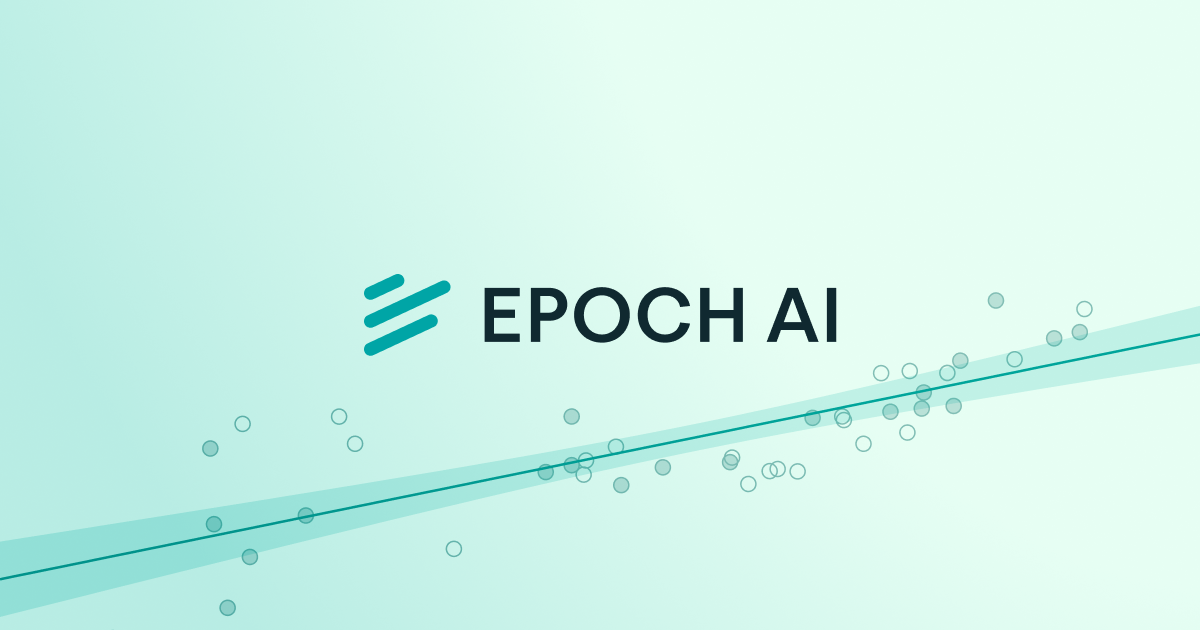What is Epoch?
Our director explains Epoch AI’s mission and how we decide our priorities. In short, we work on projects to understand the trajectory of AI, share this knowledge publicly, and inform important decisions about AI.

Published
Since we started Epoch three years ago, we have engaged in hundreds of projects and achieved a wide audience. Yet, one question I often get asked is, ‘What is Epoch?’
In a way, this is an easy question to answer. We are a nonprofit research organization with the mission of improving society’s understanding of the trajectory of AI. Simply put, we are doing what we can so that decisions about AI are informed by the best possible evidence.
To achieve this, we are curating data and conducting high-quality research into some of the most significant trends in AI. We share most of this work publicly, aimed at a broad audience, including AI policy experts, journalists and AI developers. Importantly, we are committed to always sharing what the data says, rather than tailoring it to fit a narrative.
We work on this mission because we believe that if we all collectively know more about AI, we will make better decisions on average. I will not agree with all the decisions that our work will inform — but I believe that we can have a smarter conversation about AI if it is grounded in data, and I am pleased with the level of success that we have achieved in this mission.
However, while helpful, this brief description misses many nuances of our culture and ethos. In this post, I will expand on what we do, why we do it, and what we are not. My goal is to let you know more about how we make decisions at Epoch, so you can better understand our motivations.
What we do
Our primary focus is on working on what we believe will be most helpful in understanding the present and future of AI. We are committed to sharing this knowledge publicly, because we think doing so will help inform important decisions society will make in coming years regarding AI.
AI is a rapidly evolving field, and our mission requires us to quickly adapt to trends and opportunities. This naturally leads us to change our focus fairly often, making it hard for outsiders to understand our priorities.
Below, I talk about the projects we have chosen to work on. This is not meant to be an update on our projects – instead, I want to focus on why we chose to work on what we did. This will give you a better understanding of how we choose what to work on.
We curate and analyze data on AI trends
Epoch AI began as an effort to curate and organize data on AI models, exemplified by our most cited paper to date, Compute Trends Across Three Eras of Machine Learning.
Today, we run a full-on open-source intelligence program, tracking AI models, hardware and supercomputers. To help interpret this data, we release frequent short analyses that illustrate important trends in AI.
We run this service both as a public good, funded by our revenue and philanthropic funding, and as a paid service. For example, UK ARIA has previously commissioned work on compute trends, and we analyzed biological sequence models for Sentinel Bio. For this work, we delivered brief, private reports to our clients to address their strategic questions, and publicly released the data we collected through the course of the project to advance our mission.
The rationale behind this data work is straightforward: access to up-to-date data on AI trends is crucial for decisions in investments, governance and elsewhere. By default, most information about AI will be held in the hands of a few individuals closely working in the technology, with most other stakeholders (e.g., policymakers, stakeholders from other industries, journalists, and researchers outside AI companies) having access to only a limited and delayed view of AI’s development. Epoch strives to improve this situation, so that more people have a clear strategic picture of AI.
We develop benchmarks to measure advanced AI capabilities
Our best-known work to date is FrontierMath — a private benchmark commissioned by OpenAI to measure advanced AI math capabilities. We have also run some other pilots, including benchmarks related to software engineering and remote work, and are currently exploring partnerships to develop more such benchmarks.
Our main criterion for deciding whether to work on a benchmark is whether it will improve the public’s understanding of AI’s trajectory. We chose to work on FrontierMath because we thought that a challenging math benchmark would clarify the degree to which AI is capable of solving novel and difficult reasoning problems. This bet has paid off, as FrontierMath has become a popular measure of AI capabilities.
We are committed to improving the quality and transparency of our benchmarking work. OpenAI is the only AI company with access to FrontierMath (and the upcoming Tier 4 of this benchmark, an even more difficult set of problems), which has diminished confidence in FrontierMath results for OpenAI models. For future benchmarks we develop, we are committed to retaining benchmark ownership and providing equitable access to AI companies (for example, by releasing benchmarks publicly or providing structured access to any company for a fee). We are also committed to proactive transparency — during FrontierMath, we made the mistake of only disclosing the OpenAI funding relationship to the contributors who explicitly asked. Going forward, we plan to inform all contributors proactively and not release a benchmark without clearly disclosing the funding parties.
We provide independent evaluations of AI models
Another important aspect of our work to measure AI capabilities is our model evaluation work. We maintain a public dashboard with benchmark evaluations of publicly available models. This dashboard aims to illustrate trends in AI capabilities, and we have been pleased with the positive reception of this work. We intend to continue releasing evaluations of notable and publicly available models, at least when technically feasible.
We are currently considering whether to pursue pre-release evaluation work with AI labs. We would see this as a good opportunity to improve our evaluation expertise and work closely with AI companies, but we are concerned about NDAs preventing us from sharing what we learn, which would cut against our mission.
We provide consultations and commissioned research
As part of our work, we routinely partner with other organizations that either work on AI or are affected by AI. These include: large AI companies (e.g. Google), government agencies (e.g. the UK Department of Science, Innovation and Technology), organizations working on adjacent sectors (e.g. the Electric Power Research Institute), and companies that are affected by AI (including hardware, energy and investment firms, consultancies and others).
The services we offer our partners cover the types of work described above (data collection, benchmark development, and model evaluations), as well as consulting and commissioned research. Our work with partners includes, for example, investigations into the power demand for AI, summaries of our work on AI scaling, and novel research into aggregating results from different benchmarks to measure AI capabilities.
Partnerships subsidise our public-facing work, allow us to identify projects that are more urgent and relevant, and provide feedback that improves our outputs. We also aim at delivering value to our clients, providing them with a deeper understanding of AI through consultations and private reports that explain how our work applies to their strategic situation.
In choosing who to work with, we ask ourselves the following questions:
-
Will the project help us gain a deeper understanding of AI? We have an opinionated view on what questions are most important to work on, which has prompted us to investigate important emerging trends early, including e.g. inference time scaling, or data scarcity. In our partnerships, and our work more generally, we choose to work on questions that we believe are important for the future of AI.
-
Will our partner be making important decisions that affect the trajectory of AI? We prefer to partner with organizations that are making important decisions in AI, especially in government. These partners provide us with useful feedback on what is most important to work on, and directly advance our mission of informing high-stakes decisions on AI. For example, we have partnered repeatedly with the UK Department of Science, Innovation and Technology to inform their policy decisions.
-
Will our work be released publicly? We prioritize projects with public outputs that advance the understanding of AI. By publishing our work, we reach a wider audience and impact, including reaching audiences we would not have thought of. This is not always possible — for example, when consulting for the government on sensitive topics — but these are exceptions, and we strive to find acceptable compromises.
-
Will we be able to learn from our partner? We prioritize working with partners whom we can learn from, and who can provide good feedback on our work. For example, we partnered with EPRI to produce more accurate work on energy demand for AI.
-
Are we striking a good deal? We aim to charge prices at least on par with industry consultants, so that we aren’t inadvertently subsidising the work of our partners. All the profits we make are fully reinvested into our mission, mainly subsidising our public data work and independent reports.
Throughout these partnerships, we are committed to a high level of transparency — while acknowledging that we cannot, for example, divulge details of upcoming regulation or company secrets. A list of partners we’ve worked with is available on our website.
What we are not
One other way of understanding Epoch is to compare us to organizations doing similar work, like Our World In Data (which curates and shares data about important world trends), the AI Index (which publishes yearly compilations of data on AI) and Artificial Analysis (an independent AI benchmarking & analysis company).
However, none of them is quite the right analogue. To my knowledge, there are simply no other organizations in our niche. Instead, I can discuss what we are not.
We are not an AI development company
Many of our research projects may help advance the state of the art in artificial intelligence. We partnered with OpenAI to create the best math AI benchmark today. We have gone to great lengths to study bottlenecks to AI scaling. And we have advanced research on AI scaling laws.
However, our goal is not to contribute to AI progress per se. In choosing to work on these projects, we are prioritizing our mission of improving societal understanding of the trajectory of AI.
Our staff, and the AI community more broadly, is split on whether advancing AI will ultimately benefit society. As an organization, we are decidedly neutral on this question. We will continue working on projects that advance (or slow down) AI, as long as their primary purpose is to advance the public understanding of AI.
We are not an AI policy think tank
We have partnered with government agencies worldwide, such as the UK Department of Science, Innovation and Technology. And we do see it as an important part of our mission to inform governments of the state of the art in AI, so they can enact wiser policies.
However, we do not push for any particular stance on AI policy as an organisation. While our staff have their own (diverse) opinions on how AI should be handled, we see Epoch as providing a unique service of informing everyone with trustworthy data and evidence about AI, without pushing for one agenda.
We might point out the consequences of a policy, while adhering to our usual standards of rigour and transparency. For example, we might publish estimates on the number of developers affected by a compute threshold regulation, and point out that keeping the scope limited will require elevating the threshold. And our staff members are encouraged to offer their personal opinions. But we won’t outright make official policy recommendations.
We are not a company incubator
Epoch employs a team of AI experts with a variety of opinions about AI. Some of our staff have gone on to create new organizations, premised on very different beliefs about what should be done about AI.
For instance, Epoch co-founder Marius Hobbhahn left to create Apollo Research — an AI safety organization focused on scheming, evaluations, control and AI governance. More recently, Epoch co-founder and associate director Tamay Besiroglu and three other employees left to create Mechanize — a start-up focused on creating the data to enable AI automation of work tasks.
Incubating these initiatives is not the purpose of Epoch AI, but we see it as natural for our staff to sometimes grow in directions beyond our organization. We are excited to host people on our staff with different beliefs about AI, and work with them for as long as their paths are aligned with our mission, then part ways when it no longer makes sense to continue our work together.
In the cases where our staff wants to monetize work they did while at Epoch, we might negotiate deals with them at a fair price, prioritising our mission.
Closing words
When we started Epoch AI three years ago, we saw an important role to be filled. We foresaw AI taking off, and the stakes growing. We knew that understanding what was happening would be key to good decisions. And yet, little public analysis existed documenting these trends.
We bet we could become the organization to fill that gap, and I am pleased with how far we’ve come. We will continue striving toward this mission: producing quality analysis on the trajectory of AI, so we can all make better decisions regarding this very important technology.
Jaime Sevilla
Director




